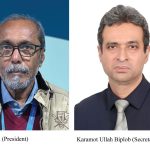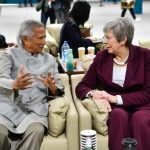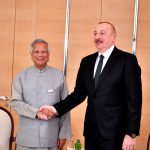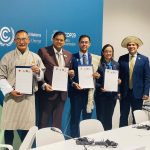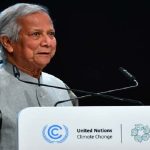
The Kazakh-Uzbek ‘Tandem’: Good For Central Asia, Not So Good For Karakalpak Activists
Last Updated on April 20, 2024 8:34 am
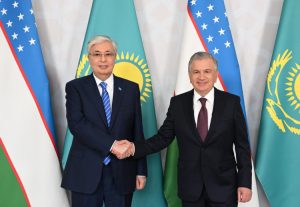
By Chris Rickleton
ALMATY, Kazakhstan — The relationship between the two most-populous countries in Central Asia, Kazakhstan and Uzbekistan, has arguably never been better.
That can only be good for Central Asia — a region that has for a long time been dominated by outside countries at the expense of genuine integration.
But it has only added to the precarity of life for activists from Uzbekistan’s autonomous republic of Karakalpakstan, which was roiled by deadly unrest that broke out nearly two years ago amid government proposals to revoke the territory’s unusual legal status.
In the last three months alone, three Karakalpak activists have been arrested in Kazakhstan, pending extradition requests penned by authorities in Uzbekistan.
Those arrests followed the release from Kazakh jails of five others following a year behind bars — the longest period under Kazakh law that anyone detained on the basis of an extradition request can be held.
And they come amid warnings from Karakalpak diaspora leaders that Uzbek-Kazakh coordination over the detentions is likely to take more subtle forms, to avoid international press attention and a negative public reaction in Kazakhstan, whose state language and national culture are very similar to those of the Karakalpaks.
But first to more positive aspects of bilateral cooperation.
A ‘Tandem’ Adapting To A ‘New Reality’?
Those were on show during a fairly low key but evidently symbolic meeting between Uzbek leader Shavkat Mirziyoev and Kazakh counterpart Qasym-Zhomart Toqaev in the Uzbek Silk Road city of Khiva earlier this month, where Toqaev described the two countries’ “tandem” as “vital.”
The relationship between Kazakhstan and Uzbekistan wasn’t ever the most problematic in Central Asia.
But when those countries’ respective first presidents, Nursultan Nazarbaev and Islam Karimov, were in power it was tinged by perceptions of rivalry that dated back to the period when both countries were Soviet republics.
An even more limiting factor in bilateral relations was Karimov’s approach to regional integration, which was cautious — to put it mildly.
Uzbekistan’s second leader, Shavkat Mirziyoev, immediately signaled that he had a different view on his country’s place in the neighborhood.
From the start of his reign, which began after his mentor’s death in 2016, he mended Uzbekistan’s broken relationships with its neighbors, accelerating work to define his country’s borders with Kazakhstan, Kyrgyzstan, and Tajikistan, while taking a more cooperative stance on water issues with the latter two countries.
Even in the case of Afghanistan, which Karimov spoke mostly about as a threat, Mirziyoev’s administration has stressed economic opportunity over security risks.
As regards his country’s relationship with Kazakhstan, an impetus for deeper cooperation has come from Russia’s full-scale invasion of Ukraine in 2022.
“Both countries are adapting to a new reality,” Tashkent-based political analyst Anvar Nozirov told RFE/RL.

“If, before, Russia was a kind of center of communications for their trade with the European Union, now, due to sanctions, they are having to explore new avenues. They have to work out how to survive.”
Trade and transit were high on the agenda at Toqaev and Mirziyoev’s April 5 talks in the Uzbek city of Khiva.
So much so that Toqaev’s office highlighted in bold the leaders’ agreement for a joint venture between the railway administrations of Kazakhstan and Uzbekistan, which will work to organize cargo transportation “along the China-Kazakhstan-Uzbekistan route” while building up traffic heading further south, through Afghanistan and on to Pakistani sea ports.
The two leaders also discussed regional cooperation in the framework of C5+ meetings, a format wherein world leaders meet with all five of their colleagues from Central Asia — the presidents of Kazakhstan, Kyrgyzstan, Tajikistan, Turkmenistan, and Uzbekistan — simultaneously.
But Nozirov argued that it is likely other equally important items were simply left out of the postmeeting communiques “in order to avoid irritating Moscow.”
That means discussions about expanding access and logistics along the Middle Corridor — an up-and-coming multimodal trade route that will connect China to Europe via Kazakhstan at the expense of overland routes through Russia — as well as expected military exercises in Kazakhstan in July that will feature the armies of four Central Asian countries and Azerbaijan.
“With the failures in the war in Ukraine, Russia’s role as a security guarantor has come under doubt. Central Asian countries also understand that deepening military cooperation with Russia while the war is happening might expose them to sanctions,” Nozirov said, explaining the unusual example of regional military cooperation without either Russia or China that was announced on the eve of the presidents’ Khiva meeting.
No Countries For Karakalpak Activists
Was the fate of Karakalpak activists based in Kazakhstan discussed by the two leaders in Khiva?
A spokesman for the Uzbek Foreign Ministry did not directly respond to that question.
The Kazakh Foreign Ministry referred RFE/RL to Toqaev’s administration, which did not respond by time of publication.
But it is evident that neither country is a safe place for Karakalpaks to engage in activism after 21 people were killed in violence during protests sparked by proposed amendments to the Uzbek Constitution that would have downgraded Karakalpakstan’s peculiar “sovereign” status (the territory has a flag and government that is nominally autonomous from Tashkent) and withdrawn its constitutional right to hold a referendum on secession from Uzbekistan.
Mirziyoev ordered the controversial amendments scrapped in a belated bid to quell the unrest.
Yet despite the trigger for the violence being abundantly clear, it is Karakalpaks who have paid the price.
Dozens were sentenced to long jail terms in Uzbekistan last year, while only three police officers are said to have been convicted, all for abusing detainees during the unrest.
And the repression continues.
On April 16, the Vienna-based Freedom For Eurasia rights group reported that Uzbek-based Karakalpak blogger Shingys Tairov was detained and sentenced to 15 days in administrative detention for a video in which he showed signage inside the territory that had Uzbek and Russian words, but none in Karakalpak, as is required by law.
That was the kind of activism often tolerated by Tashkent prior to the July 2022 unrest — in lieu of the relative thaw for freedom of speech under Mirziyoev — but the rules of the game have certainly changed.
And that is bad for Karakalpaks in Kazakhstan, who are almost always Uzbek passport holders due to the difficulties of exiting Uzbek citizenship.
According to the leading Kazakh rights organization, the Kazakhstan International Bureau for Human Rights and Rule of Law (KIBHR), at least three Karakalpak activists have been arrested in Kazakhstan in the last three months: Aqylbek Muratov in February, Rasul Zhumaniyazov in March, and Rinat Utambetov in early April.
To date, most activists have been arrested for alleged crimes against Uzbekistan’s constitutional order, which are political crimes.
Yet Koshkarbai Toremuratov, one of the five Karakalpaks to spend a year in jail in Kazakhstan following extradition requests filed by Uzbekistan in the second half of 2022, recently claimed that other Karakalpaks are now being detained for nonpolitical crimes under Kazakh law — again in cooperation with Uzbekistan but without the noise that accompanies extradition requests and charges that carry lengthy prison terms in Uzbekistan.
While Toremuratov acknowledged that he could not yet prove these reports, he has asked international organizations to investigate the apparent trend while noting that Kazakh police have stopped releasing official information about the arrests of late.
In the case of both men, Rasul Zhumaniyazov and Rinat Utambetov, Toremuratov told RFE/RL it is likely that the detentions were part of a case related to an online campaign calling for the freedom of the main defendant in Uzbekistan’s Karakalpakstan trial, Daulet Tajimuratov, a lawyer and journalist who was given 16 years in prison on charges of plotting to seize power by disrupting the constitutional order.
Another activist behind the campaign, Rakhim Pirnazarov, is currently serving a four-year sentence under house arrest in Karakalpakstan, Toremuratov said.
Free But Not Safe
It currently seems safe to assume that any Karakalpak activist arrested in Kazakhstan at Tashkent’s demand will spend at least a year in jail.
“Our government tends to consider the political component — who is making the request — first of all,” said KIBHR lawyer Denis Zhivaga told RFE/RL.
“In this case it is Uzbekistan, a country with whom we have a number of agreements on law enforcement cooperation and, of late, a lot of cooperation in general,” Zhivaga said.
Mihra Rittmann, senior Central Asia researcher at Human Rights Watch, told RFE/RL that Kazakh law does not envisage any noncustodial options for an individual subject to an extradition request.
“This means he or she could spend up to 12 months in detention without a trial — a violation of his/her right to liberty and security and a fair trial.”
After the arrest of Muratov, a well-known figure who regularly gave interviews to international media, Kazakh law enforcement cited the Minsk Convention — to which both Astana and Tashkent are party to — as a pretext for the arrest.
But Kazakhstan’s international human rights law obligations should trump bilateral or regional agreements, said Rittmann, who called for more pressure from international actors to try and prevent the arrests.
To date, none of the Karakalpak activists detained by Kazakh police have been deported to Uzbekistan.
But Zhivaga said that his organization has warned the activists of the dangers of remaining in Kazakhstan while the Uzbek criminal cases remain open.
“We have helped them apply for asylum. But realistically, practice suggests they will not get asylum or citizenship in Kazakhstan. They would be safer in third countries,” said Zhivaga.
That is something 48-year-old Toremuratov, a noted leader in the Karakalpak diaspora in Almaty, might yet achieve.
But not without difficulty.
Toremuratov went to Poland last fall to take part in a conference of the Organization for Security and Cooperation in Europe (OSCE) where he emphasized what he called the “discrimination” against Karakalpaks on the part of the Uzbek state.
Muratov’s participation in that annual human rights conference, incidentally, forms part of the Uzbek state’s case against him.
But while Muratov flew back to Kazakhstan, Toremuratov then traveled to Austria, where he made a bid for asylum, only to be deported back to Poland, where he was detained.
Though he is now free, he must report to Poland’s border authorities twice a month while his case is handled by Poland’s office for foreign nationals.


